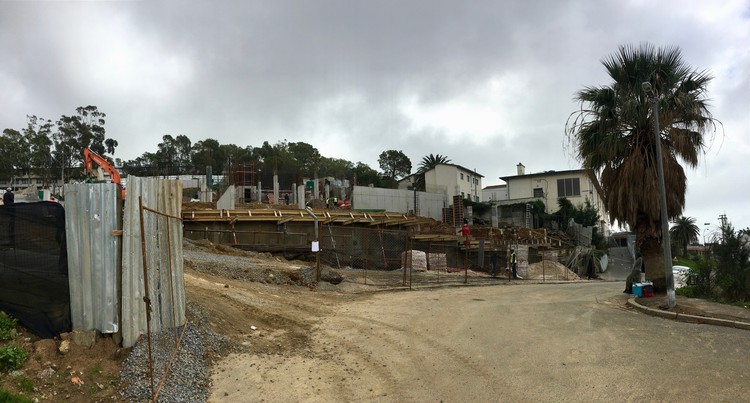
The Bo-Kaap Civic and Ratepayers Association opposes the construction of a 12-storey apartment block on Lion Street. Archive photo: Aidan Jones
13 November 2018
The Western Cape High Court has granted an interim interdict to the developers of a controversial 12-storey apartment block in the Bo-Kaap, preventing the community from interfering with construction.
On 9 November the court granted an interim interdict to BLOK Urban Living against the Bo-Kaap Civic and Ratepayers Association and the Bo-Kaap Neighbourhood Watch, ordering them not to enter Lion Street, where the block is to be built. They are also prevented from “vandalising, sabotaging, committing arson or damaging” any BLOK property, from “intimidating, threatening, and/or harassing” BLOK’s staff, and from “Interfering with the erection of a tower crane on the … construction site”.
The interdict was served on the Bo-Kaap community on 12 November.
The Bo-Kaap Civic and Ratepayers Association released a statement complaining that their constitutional right to peaceful protest had been infringed.
On 6 December the Western Cape High Court will hear arguments about making the interdict final.
Bo-Kaap residents oppose the construction of the apartment block on 40 Lion Street, called FORTY ON L.
Civic Association member Safwaan Laubscher told GroundUp the interim interdict had come without warning. “We weren’t expecting this at all,” he says.
This is not the first time that BLOK has sought an interdict against the Bo-Kaap community. BLOK obtained an interdict against residents four months ago, but according to Laubscher, it was “abruptly withdrawn”. After the withdrawal, developers and Bo-Kaap residents agreed to discuss how the construction of the building would affect the community. However, Laubscher says, “There is no community collaboration that has taken place.”
“We have been stalling and protesting and preventing the crane from entering the development,” he says.
Laubscher says BLOK’s apartments are not intended for residents who have lived in Bo-Kaap their entire lives. “We aren’t going to benefit from this development in any way. Therefore, we’re not in agreement with it taking place,” says Laubscher.
Though residents fear they will not benefit from the building of new apartments, there is an “inclusionary” housing element to BLOK’s plan. Colin Wardle of BLOK told GroundUp in June that, “The inclusionary apartments will be available at a reduced price of 30 to 50%.” The plan proposes a pilot 80:20 model, where 20% of the apartments aimed at households earning R15,000 to R45,000 per month will be cross-subsidised by 80% of the apartments.
BLOK’s 80:20 video states that the inclusionary homes, “are only available to first-time buyers who qualify based on their total household income and household size.” The Civic Association does not think this will benefit current residents of Bo-Kaap.
The “Latest News” section on BLOK’s website lauds its community engagement efforts: “We have pioneered a process whereby we have implemented a rigorous public engagement on the development, which assisted in the evolution and improvement to the building design and the 80:20 pilot model. The intention was that this progressive approach to engagement would also add value to expanding awareness around urban development and grow the public culture around constructive engagement on developments which shape our city.”